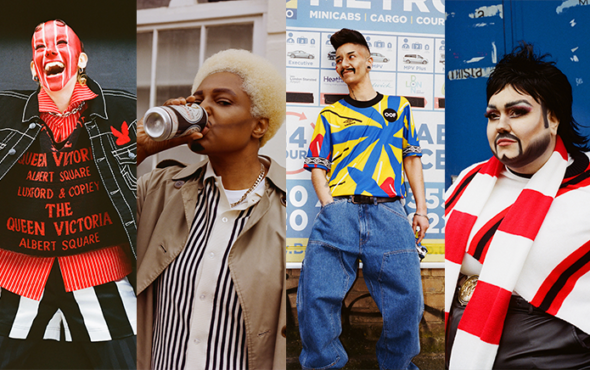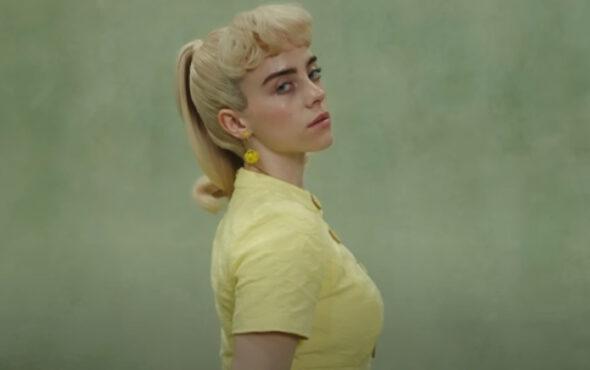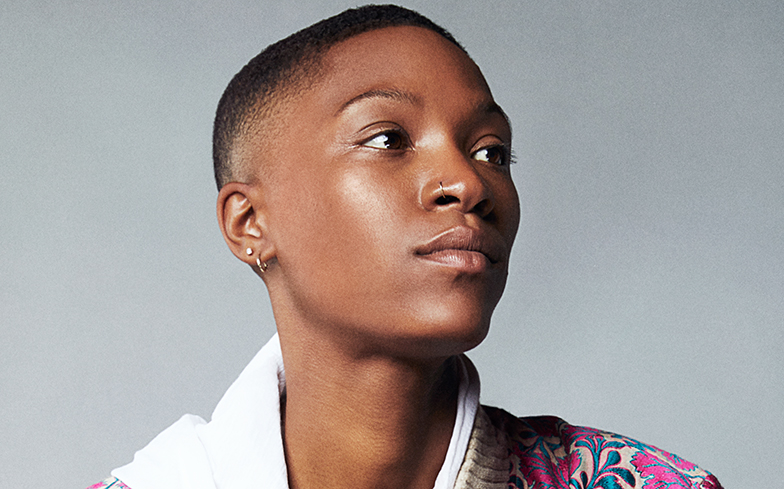
Jonica T. Gibbs is a star on the rise.
Twenties, the latest creation from entertainment mastermind and queer trailblazer Lena Waithe, is groundbreaking for many reasons, but primarily because it’s the first scripted BET series to feature a queer female lead.
The show follows Hattie (Jonica T Gibbs), a masculine-presenting lesbian trying to make it in TV, and her straight best friends Marie and Nia as they look for love and chase their dreams in modern-day Los Angeles. It’s loosely based on Lena’s own life.
“We are so unique and individual as human beings, and it’s time to see characters who differentiate from what we’ve seen in the past, that can speak to people beyond sexuality,” the show’s breakout star Jonica tells GAY TIMES.
“I think especially for children of colour, they need to be able to see different forms and versions of people of colour so they know they can be themselves.”
We spoke to Jonica about the need for more shows with queer-presenting people and people of colour, the major lessons she learned from working with Lena Waithe, and whether we can expect a second season of Twenties in the future.
First of all, how did you get involved with Twenties?
My best friend and I were crowdfunding for a show we co-wrote together, we got a really big following on Instagram and we were able to meet our goals and Lena [Waithe] was one of the people we reached out to, just to say, ‘Hey, we’re doing something cool, check it out’, and she shouted us out on Instagram and she donated to the campaign. She called me up and asked what I was trying to do, and I told her that I do stand-up comedy but I really want to get into acting, and she was like, ‘Look, I got a show we’re auditioning right now, I’m gonna call them up and bring you in’. I think it was God’s divine timing, because I didn’t have an agent or a manager at that time so I wouldn’t have gotten that audition any other way. It was just perfect timing.
When you read the script for Twenties, did you find that you related to the character Hattie?
Oh my goodness, very much so! From the moment I read the pilot script, I felt like Hattie represented a chapter in my own personal life. Not the one I was in at that moment, but I had just escaped it, so it was still very fresh in terms of financial instability and being a little aloof with your goals and plans, knowing exactly what you want to do but not necessarily knowing how to achieve it. So when I read the script I was like, ‘This is my character, I’m about to kill this audition’.
The show is groundbreaking for a lot of reasons, the main one being that it’s the first BET scripted series to feature a queer female lead. How important do you think it is for the community to see this?
I think it’s extremely important for everybody to be able to see themselves visually represented on TV and film, I think we live in such a vast and unique society, and especially because of social media people are given the confidence to be themselves. We are so unique and individual as human beings, and it’s time to see characters who differentiate from what we’ve seen in the past, that can speak to people beyond sexuality but just in terms of a character who is in a space of learning and figuring things out – and if that also includes their love life, then I think that’s relatable and people should have access to it.
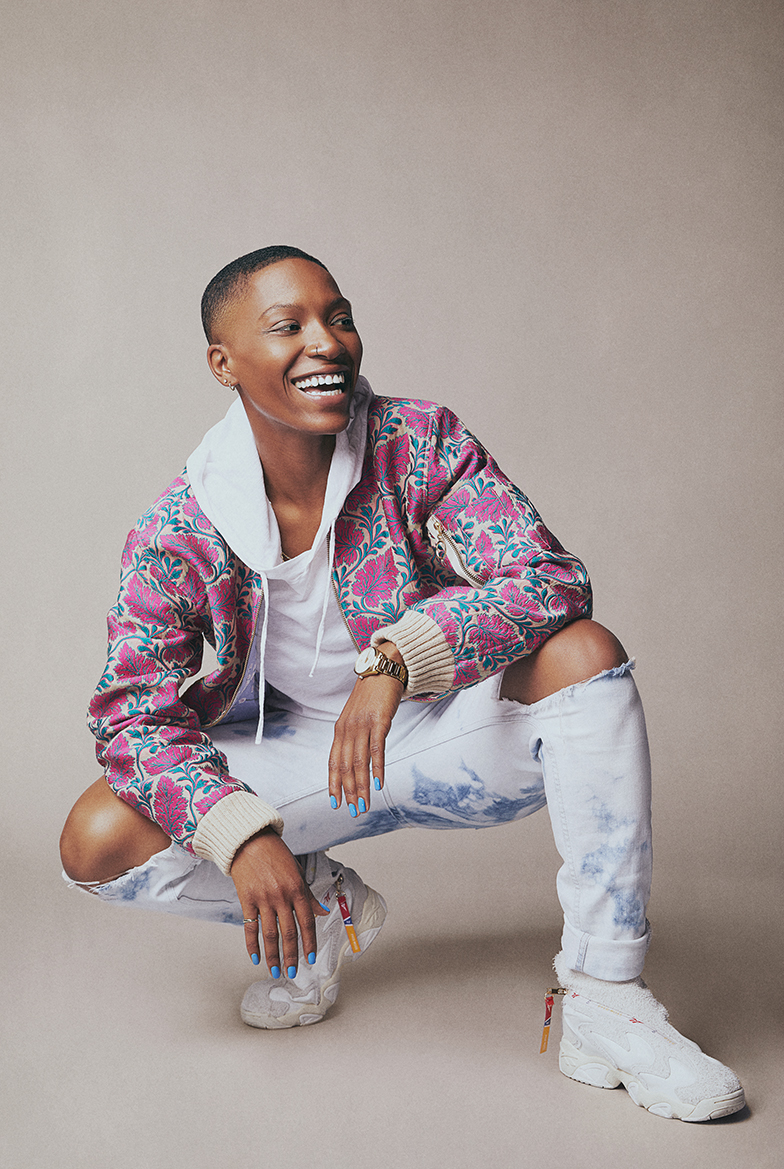
When you were growing up, did you have anyone you looked up to as a role model?
Growing up, I really looked up to older cousins in terms of their work ethic, and my mom in terms of he ability to adjust and make things happen. In terms of trying to figure myself out in my sexuality, not so much. Even if I had people around me who I may have thought were a part of the LGBTQ community, it wasn’t a space where I would feel comfortable calling them out on it or asking them, ‘Are you? And can you help me?’ So growing up I just had to deal with my feelings on my own and try to figure things out in that regard, but I think children nowadays have a lot more access to people who are making choices on their own. For instance, I used to substitute teach, and I went back after we finished shooting because I missed the kids – and I was a little bored, I guess – and one of the young girls who I taught, she asked to speak with me after class. Of course I said, ‘Sure, come back’, and she wanted to talk to me about the fact that she had always liked girls and she thought she was maybe liking a girl for the first time and she didn’t know how to deal with those feelings, and her mom didn’t know. For me, it was just very eye-opening to see the significance of that moment that she was able to come to me knowing that I was an adult figure who was mature enough to handle giving her advice and telling her about my own personal experience. I could see a physical weight lift off her shoulders when she walked out of the room, and it kind of solidified things for me in terms of how important it is to see someone who is living a lifestyle or doing something you aspire to do, regardless of sexuality, whether that’s someone financially successful, or somebody who’s high-achieving. I think especially for children of colour, they need to be able to see different forms and versions of people of colour so they know they can be themselves.
Lena Waithe has been such a role model for marginalised people, and continues to break down doors. Just recently she’s voiced the first openly gay character in a Pixar movie. What did you learn from working with her?
Straight out of the gate, the first lesson I learned from Lena was to stay ready, stay warmed up and when an opportunity comes for you to shoot the ball, you’ll sink it, you know? It’s that whole, ‘If you stay ready, you ain’t gotta get ready’ mentality, because the opportunity she presented to me came out of nowhere, it was my first ever audition so I wasn’t in the practice of auditioning, however I was in the practice of performing because I do stand-up comedy and improv. So that’s the first thing I learned from her, was that you’ve gotta be ready, because you can’t ask for something over and over and not be prepared to receive it. And then also just seeing her on set and how she’s so adamant about what she wants and how she wants things done, she doesn’t waver on her expectations or her artistic expression. I think that’s something that as women especially, we have to be able to harness that power and be able to translate it in a way that is received so that you can accomplish things and so that you can create lanes, which is something that Lena is definitely doing.
With your own starring role in Twenties, is there a part of you that’s aware that you now have this platform and you can use your voice to educate and be a role model yourself? Or do you not want that pressure and responsibility?
That’s a good question. I don’t know if I’m qualified to be the voice of certain demographics, you know what I’m saying? A lot of times people get put into a place and they don’t have all the pieces they need to thoroughly serve that particular community. I would rather it come organically, so I hope that I can impact on those that have helped me, who I work with, people watching from afar – just from me being me, and me living my life to the fullest. I think that’s one of the most impactful things you can do is to show that you can live a life fully and be true to yourself. In terms of working with people in the future, at this point I’m still new in my career so it’s almost a little daunting to think about. I don’t know what I’m gonna do, but I know that I’ve always had great intentions towards people and towards giving back, and I don’t see that wavering, and I see myself being a positive influence for the community and helping to lift other people up.
One thing I appreciated about the show is that it opens with a sex scene between two women of colour, which is something we really don’t see often on our screens – if at all. Was that important for you, to know that the show wasn’t going to shy away from things like that?
I wouldn’t say that it was important to me, but I saw it as a challenge as an actor – when it’s your second day ever on set and you’re doing a sex scene, it’s a lot to swallow! So that’s really more what I was focused on. But in terms of Hattie’s sexuality, more than anything I was really hoping that the show presented a form of inclusivity that was fluid and natural and showed that as a part of the LGBTQ community we’re not this segregated demographic. Really, if you mind your business, why do you care who somebody’s having sex with? Unless you’re jealous or you’re envious of their right to freedom, which I understand, but you need to keep that energy to yourself. So that’s the thing I was most concerned about. But I was liberated in that scene, in a lot of regards, because I think it is beautifully shot and so well done and so artistic that it’s more than a love scene, it’s just two people who are enjoying themselves in the early morning with the light coming in, basking in glory. It’s so tastefully done, and I think it wasn’t until after I saw what [director] Justin Tipping did with the shot and how they cut it all together, regardless of whether it’s heterosexual or gay or whatever, this is just a beautiful display of love and affection between two humans.
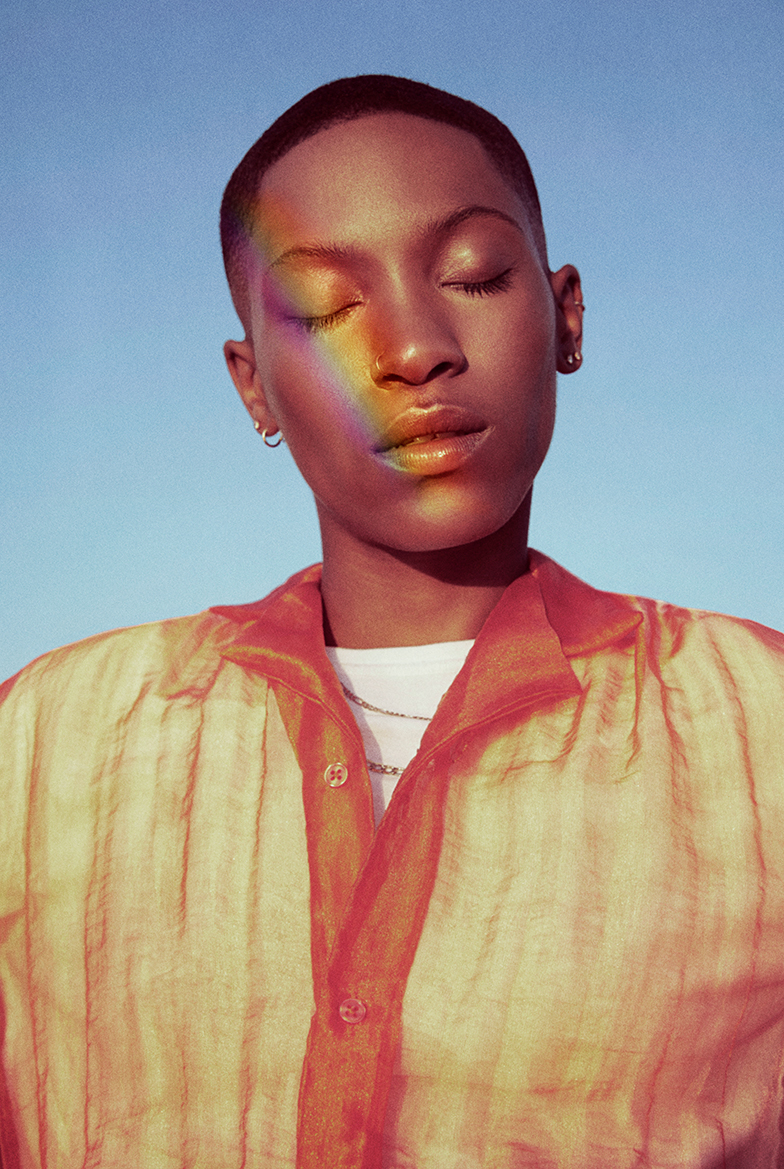
Another scene I found interesting was when Hattie’s old tweets are brought up during a job interview, because that’s something that’s happened a lot recently with this idea of cancel culture. Do you think things that people have said years ago should be held against them?
I don’t know, it’s a tough question. I guess it all depends on what you said! I do think that people go through chapters in their lives and we all evolve and transition, and I do think we have to be empathetic to people. But at the same time, I could say, ‘Oh they were young when they did it, that was years ago’, however somebody else might say, ‘When I was that age I didn’t say those things, I knew better’. It also depends on your position, too. If you work in politics and you’re out there choosing laws and things that influence people’s lives, and five years ago you said something racist or sexist, then that may still be a part of your personality or thought process that could influence your decisions. It just depends. Society is gonna do what they wanna do with it either way.
The show stars a lot of powerful female icons like Vanessa Williams and Jenifer Lewis – how did it feel knowing you were going to be working alongside them?
Oh my goodness, it’s such a blessing, especially after growing up watching these people. When Vanessa Williams walked on to set, I was just like, ‘Oh my god, she is literally about to do a scene with me’. She was so elegant but still down to earth, it was a pleasure to be in her presence. Unfortunately I did not get to do a scene with Jenifer Lewis, even though she is hilarious, and has been doing this for so long, it’s admirable how much longevity she has had in the industry. It’s about professionalism and getting the job done, at the end of the day, doing your craft and revelling in the opportunities to exercise that craft. I don’t know if I told them, but I definitely learned something from them about professionalism and doing what you gotta do.
What kind of response have you had from the show? I imagine for a lot of people it’s one of few times they’ve seen themselves represented on TV, especially if they’re relating to your character.
The response has been so positive. I’ve only gotten – and I’m gonna knock on wood – one negative comment from a person on Instagram, and it wasn’t even in regards to me. She was upset because I posted something in memory of Kobe Bryant and his daughter Gianna, and she was talking about the whole thing of me being a black lesbian being held accountable for feminism, she was like, ‘Well I see what kind of person you are’. I was just like, ‘What?’ It showed me that there are gonna be some people out there who feel an ownership over you a little bit because you represent their demographic, you know? So I just blocked her. That opened my mind to how people might be thinking, but no one else other than that one specific time, the response has been so positive, so encouraging, and people are so grateful for the show. I’m not on Twitter for the same reason you just said – people hold what you say on Twitter to a higher regard than anything else, and it’s a little weird. So I don’t really tweet that much, but I went on after the show came out and everybody was so positive. Twitter can go one of two ways, and we were in the positive swing of things. It’s amazing.
The show’s premiere had 1.9 million views, do you think this shows that there’s an audience for it?
It’s so major and so significant because numbers matter in this industry. It shows there’s an audience for it, it shows that people want it, and it gives people who haven’t watched it the curiosity to check it out. Because when something’s getting numbers, that matters just as much as the art in this industry. It’s been great.
At the same time, whenever there’s a film or TV show about any minority, whether that’s queer people or people of colour, it feels like a lot of importance is placed on the viewing figures as to whether something like this can be a success or not. Do you think that’s fair? Or do you think the importance of something like this should outweigh the commercial success?
I mean, that would be nice! But I don’t know if rules should apply differently to a demographic just because they’re not represented as much. When it comes to film and TV, I don’t know if there’s that same right of equality just because it is all about money, and at the end of the day you just have to create content that’s entertaining and that’s gonna pull people in regardless of your particular orientation or demographic. Also, in today’s new age of TV, it’s very rare that we get a show like The Fresh Prince of Bel Air that lasts for 10+ seasons, you know? That’s just not normal for anyone anymore. I do think there should be more opportunities and more chances to roll the dice, that’s where I think the difference needs to happen. There needs to be more shows with queer-presenting people and people of colour, and it won’t be a big deal because it’ll just be another show. So yeah, I think those demographics should have more opportunities to give it a go, however at the end of the day if you’re not meeting the expectations and there’s no one seeking your content, then it is what it is.
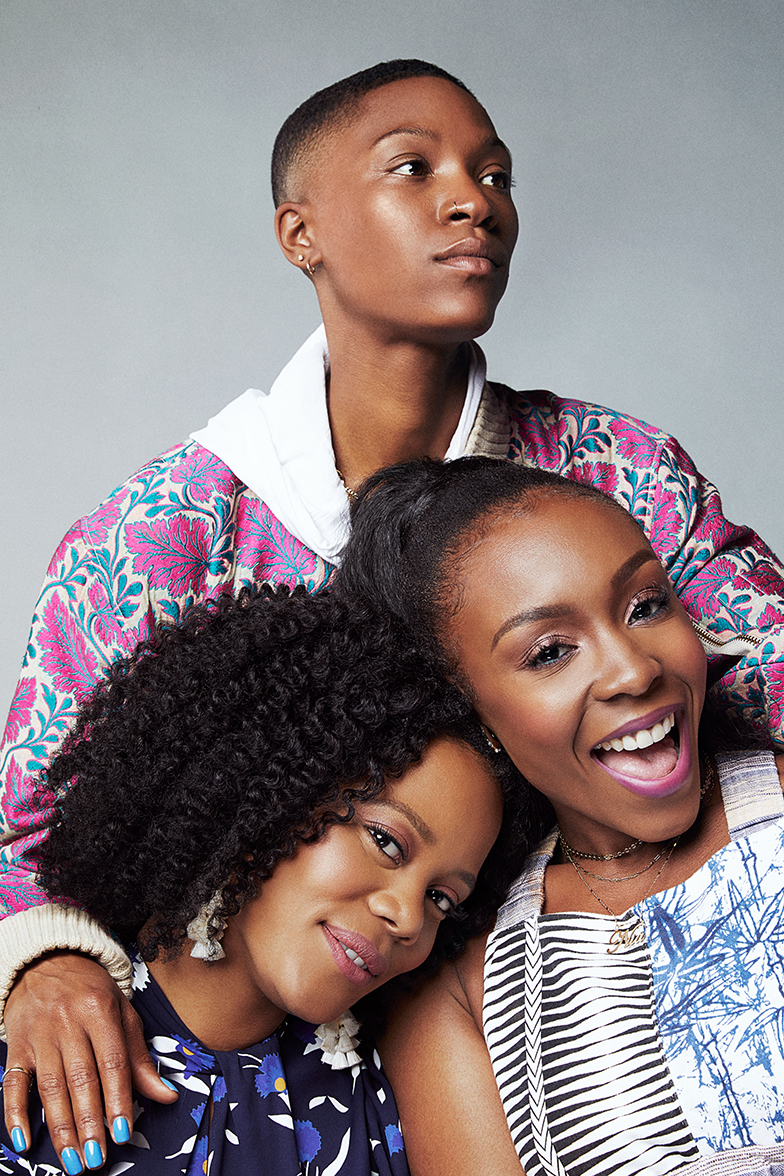
There’s that debate in the show about whether art should be supported because it’s made by black people or whether it should be supported because it’s good and just happens to be black. Where do you personally fall in that argument?
The thing is, what I learned from stand-up comedy is that art and what people find funny or entertaining is so subjective. So what you may like or dislike could be completely different from your 82-year-old auntie. You can be family members and y’all could be on two different wavelengths with what you enjoy. So in terms of what somebody thinks is good or not good, it’s a tough one. Everybody should have space for representation and to see something on TV they enjoy, but like I said, if it don’t make dollar it don’t make sense. That’s just how things are. Something I definitely learned from being a journalism major and having to write papers is that it’s all contingent upon your subjective receiving of what you’re watching or reading. I don’t know. It’s a tough one too! Sorry if I’m keeping it vague.
To wrap this up, I need to ask… will we be getting a second season of Twenties?
Oh my goodness, I absolutely want a second season, I want a third season, a fourth potentially, who knows? I know that BET is very excited about the show, it’s been getting a great reception from critics and that’s very significant, and I think the people want it. I hope we get more episodes, that would be really dope, and I’ll be even better because I’ll be more versed in this industry and more prepared. I really hope we get a season two. Be on the look out.
Twenties airs on BET.

